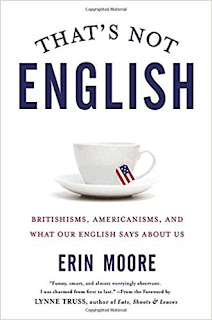That's Not English
 That's Not English: Britishism, Americanisms, and What Our English Says About Us, by Erin Moore
That's Not English: Britishism, Americanisms, and What Our English Says About Us, by Erin MooreThis was a fun, fast read that I enjoyed a lot because I will never not want to read books comparing the British to Americans and vice versa. I cannot get enough of those.
Erin Moore is American-born, moved to England, married into a trans-Atlantic family, and is now raising a little Briton of her own, so she's had plenty of opportunity to experience culture shock (both ways) and delve into the mysteries of our respective characters. Each chapter is dedicated to a word or expression that either means different things to each side (quite, sorry, cheers, ginger) or is practically unknown to one side (knackered, bespoke, dude). So, some random observations from me:
Indeed, I use quite as an intensifier that means just plain really. Apparently Britons aren't quite that enthused when they say it.
Moore says that English parents say to their children "You get what you get, and you don't get upset." She then comments that "These sentiments are so un-American it is not even funny." This shows that she really hasn't done her parenting in the US, because everybody I know says "You get what you get, and you don't throw a fit" several times a day.
Indeed my kid's red hair has always been considered enviable, and pretty much only that. She considers 'ginger' to be a term of pride.
Someday I'd like to see a real British pantomime. I'd be completely bewildered, even though I do kind of know the basics. One of the strangest sentences in this whole book is about American actors appearing in panto: "In recent years, both David Hasselhoff and Vanilla Ice have played Captain Hook in regional English theaters...as I write this, Henry Winkler -- the Fonz himself -- is playing Hook in Liverpool."
Moore says that if there is one Americanism that Britons never, ever pick up, it's dude. I would LOVE to talk about dude, folks, so any British people reading this, you have to tell me what you think about dude. I, being a California girl, cannot go an hour without saying dude. I don't notice that I'm doing it -- it's a less noticeable word than like (which I also say, but not nearly as much). I clearly remember being in Denmark, in 1989, and trying to help the English teacher learn how to say dude. You have to say it in that particular way, you see.
 And here's the thing about dude: it is the single most flexible, most adaptable word in English. You can use dude to express virtually ANY emotion, with the possible exception of deep, heartfelt love. Deep, heartfelt sympathy, yes absolutely, but preferably not a marriage proposal, though I'm sure it's been done.
And here's the thing about dude: it is the single most flexible, most adaptable word in English. You can use dude to express virtually ANY emotion, with the possible exception of deep, heartfelt love. Deep, heartfelt sympathy, yes absolutely, but preferably not a marriage proposal, though I'm sure it's been done.Of course, you've seen the little meme going around about how dude can address anyone and anything. Or maybe you haven't, so I'll put it here. It is completely true.
I can quite see that a Briton would probably find it a non-comfortable word to use. I'd just like the discussion.




Sounds like fun!
ReplyDeleteI would love love LOVE to see a panto! One of these days I need to make it happen, they sound absolutely bananas.
ReplyDeleteIs it true that British people never pick up the word 'dude'? Is that real? Because that is kind of astonishing considering how often American people (me) say it. Are there any comparable British words that Americans never pick up?
It is kind of astonishing, yes! But I need a Real British Person to show up and let me know whether it's true. It is sort of difficult to actually imagine, though. Hm, I'm not sure if there are any we've NEVER picked up. There are quite a few that I would feel pretentious and silly saying, like 'cheers' or 'boot.'
ReplyDeleteI felt a little odd on the East Coast saying, "Dude" and "Howdy."
ReplyDeleteThat sentence about red hair seems a little out of place. Was there supposed to be more there?
Aussie’s also don’t use dude. I’ve only ever said ‘dude’ when pretending to be an American!!
ReplyDeleteA large number of Australians use ‘mate’ instead. Again I’ve never used mate in general conversation! Not sure what the Brits say. Maybe, like me, they get by without needing to use a non-gender specific greeting 😊
Last time I was in the UK, brill & gobsmacked were 2 words that seem to be UK-centric.
ReplyDelete...you said 'howdy'? I'm not sure I've heard you use that one a lot. About the red hair, no, I couldn't think of anything else to say there in response to the chapter about ginger-persecution in the UK.
ReplyDeleteBrona, maybe Brits say mate too? I feel like that sounds like something real. 'Mate' is certainly a good useful term -- seems to cover about the same territory.
This book started my fascination with pantos: http://www.joyweesemoll.com/2015/12/04/thats-not-english-bookreview-brifri/
ReplyDeleteI can't help you with 'dude.' Growing up in Missouri, I've only heard it used to make fun of Californians.
Aw dude, Joy, that hurts! :)
ReplyDelete